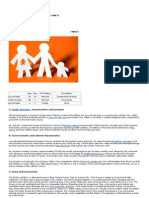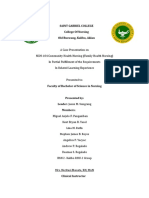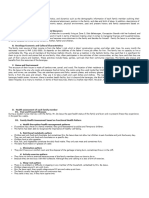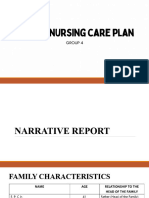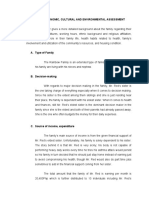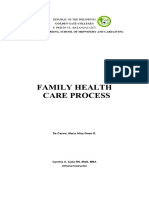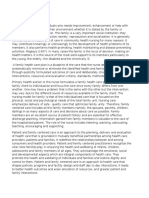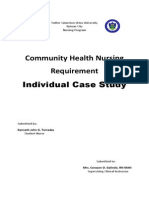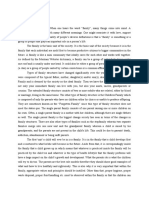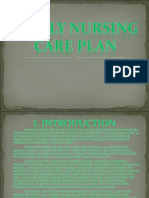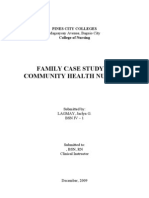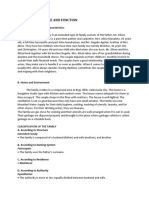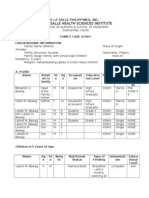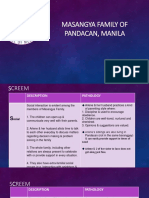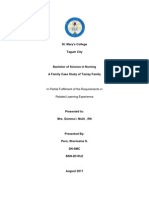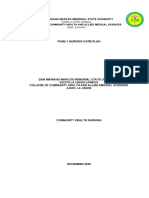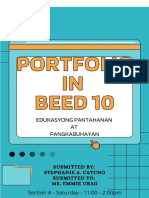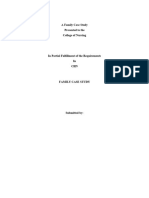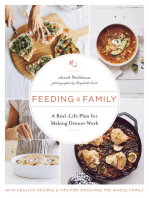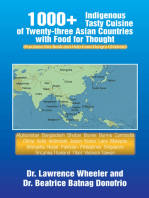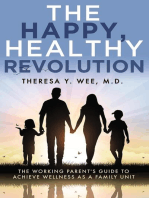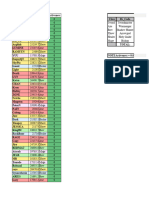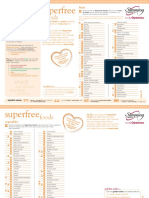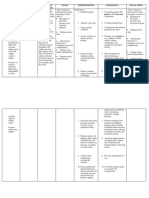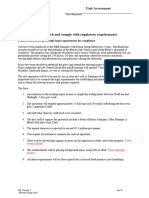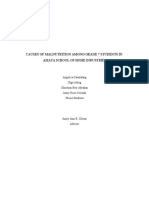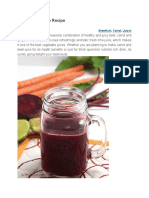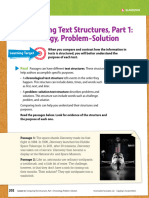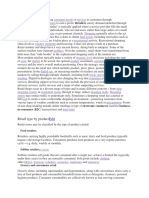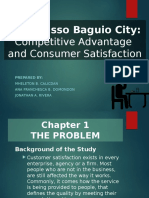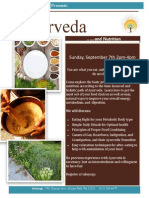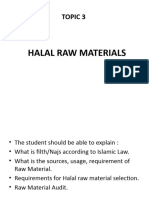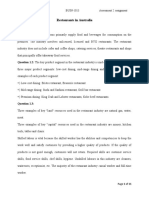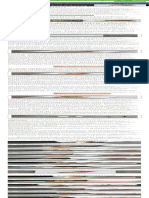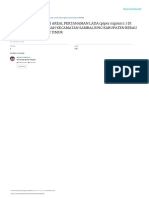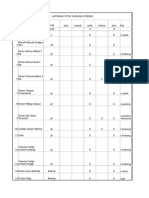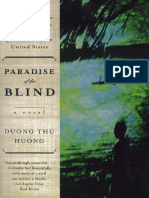Socio Economic, Cultural, and Developmental Assessment: Iv. Socioeconomic
Socio Economic, Cultural, and Developmental Assessment: Iv. Socioeconomic
Uploaded by
Noey TabangcuraCopyright:
Available Formats
Socio Economic, Cultural, and Developmental Assessment: Iv. Socioeconomic
Socio Economic, Cultural, and Developmental Assessment: Iv. Socioeconomic
Uploaded by
Noey TabangcuraOriginal Description:
Original Title
Copyright
Available Formats
Share this document
Did you find this document useful?
Is this content inappropriate?
Copyright:
Available Formats
Socio Economic, Cultural, and Developmental Assessment: Iv. Socioeconomic
Socio Economic, Cultural, and Developmental Assessment: Iv. Socioeconomic
Uploaded by
Noey TabangcuraCopyright:
Available Formats
IV.
SOCIOECONOMIC
SOCIO ECONOMIC, CULTURAL, AND DEVELOPMENTAL ASSESSMENT There are great many factors that affect the health of a family. As a result, the health status of each family is different. These factors may be social, economical and/or cultural. These factors need to be assessed to determine accurately the health status of the family. In this chapter, these are depicted through assessment.
A. TYPE OF FAMILY
The Alphabet Family is classified under nuclear type. A nuclear type family refers to a household consisting of a father, a mother and their children all in one household. The advantage of a nuclear type of family is there is a genuine support during crisis.
The structure of family that the Alphabet Family has is Patriarchal. Patriarchal is a social system in which the father is the head of the family and men have authority over women and children (http://www.thefreedictionary.com/patriarchy).
The family is composed of six members: Father A and Mother B, and their children: C, D, E, F, eldest to youngest respectively. The family practices the traditional expected duty that each family member must perform.
B. DOMINANT FAMILY MEMBERS IN TERMS OF DECISION MAKING
The assessment of familys decision making process and the identification of the dominant family member would enable the student nurses to identify the predominant decision maker and how the family interacts with each other. This would greatly influence their perception of the identified problem and the familys pattern of decision making particularly on health issues.
Being a nuclear type of family, as the head of the family or the father, the decision making revolves around Father A. As the head of the family, he works and supports the family with their financial needs, and he has the final decision on issues like physical, emotional, and financial and other aspects that are involved in the family except for health in which Mother B is the one who take charge.
C. SOURCE OF INCOME, EXPENDITURES
Father A, as the head of family, works hard to provide the basic needs of each member. Father A earns roughly P 233 per day. His work is contractual, so approximately he earns P 7000 a month which is not sufficient to support the family. Each family member only gets P 1166.66 per month which is according to National Economic and Development Authority (NEDA) monthly poverty threshold is P 2,768.60 per individual.
The familys income is allotted for the following expenses per month: EXPENSES FOOD ELECTRIC BILL SCHOOL EXPENSES WATER OTHER EXPENSES TOTAL: AMOUNT 3000 300 1000 500 2200 P 7000
With this, the family is considered poor. This means that they need an additional income of P1, 601.94 a month in order to meet the qualification of National Economic and Development Authority (NEDA). Their income is not sufficient to meet their basic needs. Also, according to the mother they have no extra savings to finance their needs whenever there is an emergency.
D. WORKING HOURS
Father A is the primary worker of the family. He works as a contractual gardener. His working time is from 6:00 a.m. to 6:00 p.m. Mother B usually stays at home to do the household chores and takes care of her children.
E. ETHNIC BACKGROUND AND RELIGIOUS AFFILIATION
The assessment of ethnic background and religious affiliation of a family affects the familys norms, belief and practices especially in decision making. Given the information regarding their respect of familys identity, it would give the group a background as to how the family would interact, perceive and address the problems that are to be identified during the conduction of family case analysis.
Father A's family of origin came from the province of Batangas, on the other hand Mother B is originally from Pampanga. Father A was born in Batangas but was later on, brought up and raised in Pampanga. Father A spent most of his life in Pampanga after his family decided to move out from Batangas to find a better source of income. Through the years he spent in Pampanga he finally settled in Macapagal Village, Clarkfield after he met his wife. They first met while Father A was working as a gardener in Balibago, while Mother B was working as a maid in the same household. They had a civil marriage. Father A works for the Alphabet Family. The family is affiliated to Roman Catholic Church. His wife, Mother B, is a local who owns a parsel of land, inherited from her parents, in Macapagal village wherein they established their family. Soon after they was fortunate enough to have four children and found a job nearby, still as a gardener working at Fontana Leisure Park.
F. SIGNIFICANT OTHERS ROLE
The relatives of the family are not involved in any of the decision making within the family. In terms of financial insufficiency and emergency, the mother of Mother B usually helps them by lending them some money.
G. HEALTH HABITS AND BELIEFS
The familys health habits and practices are traditional. When asked if they believe in herbolarios and hilots, Mother B said, yes. As being practiced, when a family member is sick, Mother B immediately takes her children to the Barangay Health Center. And when the Barangay Health Center does not have the necessary medications, they will just stay at home and ask for the assistance of herbolarios and hilots.
During the assessment, the student nurses have noticed that the family has a poor personal hygiene. They were observed wearing dirty clothes and all of them have long finger nails and toenails with presence of dirt as well as their hands and feet.
H. FAMILYS INVOLVEMENT IN COMMUNITY ACTIVITIES
The Family do not participate much in community activities because they think that there are a lot more important things to do other than that. Like earning money for the family and looking after the children. But the family joins a feeding program
whenever it is held in Macapagal Village. Mother B used to attend Mothers Classes as well.
The Alphabet family, although Father A's work takes up most of his time, he makes sure that he, together with his family finds time to participate in the community they belong to. They particularly involve themselves through programs such as "Tapat mo Linis Mo" program through responsibly cleaning around their family's vicinity. The family also often takes part in community gatherings such as Fiestas that are celebrated in their village. They are also well entailed in their religious roots through joining prayer vigils, novenas and the like.
I. FAMILYS UTILIZATION OF COMMUNITY SERVICES/ RESOURCES
When a family member becomes sick, the family utilizes the health center. Aside from consultations, the children also got their immunizations in the health center.
Aside from the health center, the community has its own basketball court near the barangay health center, where the children utilize it for fun and enjoyment.
There are also "sari-sari" stores in the community, wherein the family gets their daily necessities like food, and the like.
J. HOUSING CONDITION
The type of house the family is light for it is made up mainly of plywoods, galvanized iron and cartons. Their house has living room, bed room, dining area, and kitchen where mostly separated by improvised dividers. The family owns the house.
The house measures 3m x 4m. The total floor area is 12 m2. It shows that there is no adequate space since most of the spaces inside the house are being occupied by different furniture and garments. Required space for each member is 3 m2 for adult and 1.5 m2 for children and the space they have for each member is 1 m2 .
COMPUTATION OF ADEQUACY OF LIVING SPACE Floor Area = = = Length x width of the house 4m x 3m 12m2
Adequacy of Living Space = = = = = = 2 adults x 3 m2 6 m2 4 children x 1.5 m2 6 m2 6 m2 + 6 m2 12 m2
But due to the different furniture and garments scattered inside the house, this space makes inadequate for the family.
The family sleeps beside each other. The family has bed frame located inside the living room. With regards to the adequacy of lighting, the students had also classified it as inadequate. There is inadequate lighting during daytime because upon the entrance to the house, they had observed that a person could not read properly. There is not enough sunlight entering the house. There is only one window that is open. The family only uses an incandescent bulb (75 watts) during night time.
K. FOOD RESOURCES, STORAGE, AND COOKING FACILITIES
Food sources, storage and their present cooking facilities must be adequate to sustains familys nutritional needs. Since this greatly affects the family in proper handling of food.
The family usually eats vegetables and fish meat. They cook viand that fits their budget. The family buys their food in a nearby "sari-sari" store. Mother B said that she only prepares one viand of food since their budget would not allow them to have more. Also, they do not have a refrigerator or a cabinet to store their food. They make use of plates to cover leftover foods, but most of the time they tend to finish what is prepared for them. The family does not have enough cooking utensils they only have one casserole and frying pan, and a clay pot, two soup ladles, and one knife. Their cooking facility is
situated inside their house. Also, it is situated in a low area, which can be easily reached by the children, which is a hazard for the family.
L. WATER SUPPLY
Water is very vital to human life because it is our main source of fluid. If water source is unsafe and infected it can cause diseases that are brought by harmful microorganisms Thus, health can be compromised. Water potability should also be assessed.
The Alphabet family and majority of the households in Macapagal Village procure their water supply from the communal faucet. Early in the morning, Mother B would prepare containers wherein water would be stored coming from the water supply. She would wait in line and pay two pesos per gallon of water she would need.
M. DRAINAGE SYSTEM
The assessment of drainage system is necessary to determine the presence of water stagnation or flow in the household. Poor drainage induces stagnation of water that may result to presence of mosquitoes and eventually can cause diseases.
Their drainage system is an open type, stagnant and is trashed with candy wrappers, plastics and filled with mud. This is the reason why it emits a very foul odor. It fosters environmental vectors to thrive in and eventually can cause diseases in the family.
N. TOILET FACILTY
Toilet facility is assessed in order to determine if the family practices proper hygiene, sanitation that could greatly affect human health. This is also essential in maintaining cleanliness in their surroundings.
The family owns a toilet facility that does not have flush and water carriage. It is situated at the back portion of the house. The toilet facility is not well maintained. There is a foul odor coming from it. Breeding sites for rodents were also noted inside the facility specifically mosquitoes.
O. SOCIAL AND HEALTH FACILITIES AVAILABLE
The health center in Macapagal Village, Clarkfield, Pampanga is usually utilized by the family because of free vaccines. Their children got their immunization in the Brgy. Health Center.
Social facilities the Alphabet family utilizes include the nearby barangay hall where they perform their general assembly.
P. COMMUNICATION AND TRANSPORTATION FACILITIES
The family owns two cellphones as means of communication. According to Mother B, they use their cellphones to communicate with their relatives in Batangas and to easily reach Father A in case of emergency.
As for transportation, the family owns a bicycle. It is the Fathers means of getting to his work. Usually the rest of the family members just walk to reach nearby places. Whenever they really need to go to the far places like hospital, mall, parks, and the like, they usually ride a tricycle and at times, a jeepney if they had it scheduled at night.
You might also like
- Community Health NursingDocument49 pagesCommunity Health Nursingjan micahNo ratings yet
- Family Care PlanDocument25 pagesFamily Care PlanRhomz Zubieta RamirezNo ratings yet
- Family Case PresentationDocument189 pagesFamily Case PresentationMj BrionesNo ratings yet
- Family Case StudyDocument30 pagesFamily Case StudyKiela Nicole Gatpandan AguilarNo ratings yet
- Family Nursing Care Plan: (A Case Study of Paglingayen Family)Document9 pagesFamily Nursing Care Plan: (A Case Study of Paglingayen Family)Adrian MallarNo ratings yet
- CHN Case Study 2019Document24 pagesCHN Case Study 2019Clarisse Anne Quinones50% (2)
- Sample Initial Data BaseDocument3 pagesSample Initial Data Basebrianna elizabethNo ratings yet
- Family Nursing Care Plan G4 BSN2 4 DonDocument31 pagesFamily Nursing Care Plan G4 BSN2 4 DonStuart BlackNo ratings yet
- Heaslth TetsingDocument27 pagesHeaslth TetsingRainier IbarretaNo ratings yet
- G15 - MirandillaDocument13 pagesG15 - MirandillachrstiannNo ratings yet
- CHN FNCP 1Document31 pagesCHN FNCP 1Benju Arios TamayoNo ratings yet
- IV. Socio Economic, Cultural and Environmental AssessmentDocument52 pagesIV. Socio Economic, Cultural and Environmental AssessmentJanella PinpinNo ratings yet
- FNCPDocument5 pagesFNCPGwen De CastroNo ratings yet
- Case-Study-12 8 2Document16 pagesCase-Study-12 8 2Jaylen CayNo ratings yet
- I. Initial Database For Family Nursing PracticeDocument6 pagesI. Initial Database For Family Nursing PracticeAyaBasilioNo ratings yet
- FNCPDocument12 pagesFNCPMikko McDonie VeloriaNo ratings yet
- Tirao Family's Initial Data Base A.) Family Structure, Characteristics and DynamicsDocument3 pagesTirao Family's Initial Data Base A.) Family Structure, Characteristics and Dynamicsjames_poNo ratings yet
- Indi Case StudyDocument17 pagesIndi Case StudyKenTorredesNo ratings yet
- INTRODUCTIONDocument21 pagesINTRODUCTIONAlmira GamaoNo ratings yet
- FFamily Case Study Compilation 2Document501 pagesFFamily Case Study Compilation 2Trisha Anne WacasNo ratings yet
- A. Family Structure, Characteristics and Dynamics TheDocument3 pagesA. Family Structure, Characteristics and Dynamics TheJessa_Krisma_T_1321100% (4)
- Sample Family Nursing TypologyDocument17 pagesSample Family Nursing TypologyRafael FrancoNo ratings yet
- Family Nursing Care PlanDocument34 pagesFamily Nursing Care PlanJai - Ho57% (14)
- Family Health Assessment Paraisong SalatDocument15 pagesFamily Health Assessment Paraisong SalatArk Raphael N. LEONORNo ratings yet
- Family Nursing Care PlanDocument35 pagesFamily Nursing Care PlanJai - Ho87% (15)
- Eto Na FNCPDocument96 pagesEto Na FNCPCastillo EmilyNo ratings yet
- CHN Part 2Document19 pagesCHN Part 2sonnysomera0% (1)
- Family Case StudyDocument24 pagesFamily Case Studycamel100% (1)
- Family Health ProfileDocument11 pagesFamily Health ProfileNicole Anne BejoNo ratings yet
- FNCP New EditedDocument13 pagesFNCP New EditedMelissa Joy DollagaNo ratings yet
- FHNCPDocument15 pagesFHNCPJamil Lorca100% (4)
- Family Nursing Care PlanDocument19 pagesFamily Nursing Care PlanCarmella Dawn100% (2)
- CHN 0 Family Case StudyDocument27 pagesCHN 0 Family Case Studylejeaimee100% (19)
- Family Case Study-AbstractDocument3 pagesFamily Case Study-AbstractKatherine 'Chingboo' Leonico LaudNo ratings yet
- Family Case PresentationDocument32 pagesFamily Case PresentationMay Chelle Erazo0% (2)
- I. Family Structure and FunctionDocument7 pagesI. Family Structure and FunctionJoshua ParilNo ratings yet
- ArasDocument35 pagesArasKevin Nave RiveraNo ratings yet
- SCREEM + RecommendationsDocument8 pagesSCREEM + RecommendationsKim RamosNo ratings yet
- Family Case StudyDocument20 pagesFamily Case Studyonealmahilum3No ratings yet
- Family Nursing Care PlanDocument27 pagesFamily Nursing Care Planshayne_peroNo ratings yet
- Community FNCP Complete 1Document27 pagesCommunity FNCP Complete 1Catherine Sinen ObinqueNo ratings yet
- Local Media7224319688528714389Document27 pagesLocal Media7224319688528714389Kristel AnneNo ratings yet
- LackingDocument19 pagesLackingStephen HermosoNo ratings yet
- Partial Fulfillment of NCM 109 Care of Mother and Child at Risk With ProblemDocument29 pagesPartial Fulfillment of NCM 109 Care of Mother and Child at Risk With Problemsleep whatNo ratings yet
- Family Case StudyDocument24 pagesFamily Case StudyJulius BravoNo ratings yet
- Family Nursing Care PlanDocument26 pagesFamily Nursing Care PlanDALE DELA CRUZNo ratings yet
- The Building Block of A Community Is Family.Document17 pagesThe Building Block of A Community Is Family.Cj MaravillaNo ratings yet
- Epp Portfolio (Catcho)Document15 pagesEpp Portfolio (Catcho)Stephanie CatchoNo ratings yet
- Chapter 1Document19 pagesChapter 1Rose Ann Agatep JacobNo ratings yet
- Family AssessmentDocument17 pagesFamily AssessmentJwllyn CC100% (2)
- Family Case StudyDocument25 pagesFamily Case StudyJezner GamosNo ratings yet
- Family Case Study SampleDocument28 pagesFamily Case Study SampleLars JayhawkNo ratings yet
- Family Case StudyDocument5 pagesFamily Case StudyAnn Michelle Tarrobago100% (1)
- 1000+ Indigenous Tasty Cusine of 23 Asian Countries-Comes with Food for Thought: (Purchase This Book and Help Feed Hungry Children!)From Everand1000+ Indigenous Tasty Cusine of 23 Asian Countries-Comes with Food for Thought: (Purchase This Book and Help Feed Hungry Children!)No ratings yet
- The Happy, Healthy Revolution: The Working Parent's Guide to Achieve Wellness as a Family UnitFrom EverandThe Happy, Healthy Revolution: The Working Parent's Guide to Achieve Wellness as a Family UnitNo ratings yet
- Family Fun and Fitness: Getting Healthy and Staying Healthy--TogetherFrom EverandFamily Fun and Fitness: Getting Healthy and Staying Healthy--TogetherNo ratings yet
- Every Family is Uniquely Special- Children's Family Life BooksFrom EverandEvery Family is Uniquely Special- Children's Family Life BooksNo ratings yet
- Sprout Right Family Food: Good Nutrition and Over 130 Simple Recipes for Baby, Toddler, and the Whole Family: A CookbookFrom EverandSprout Right Family Food: Good Nutrition and Over 130 Simple Recipes for Baby, Toddler, and the Whole Family: A CookbookNo ratings yet
- Syn Fam DataDocument9 pagesSyn Fam DataNoey TabangcuraNo ratings yet
- The Game PlanDocument19 pagesThe Game PlanNoey TabangcuraNo ratings yet
- Legal and Ethical Issues For A Safe Nursing Practice: Atty. Antonio D. Rebosa, M.D.,Bscrim, FCLMDocument12 pagesLegal and Ethical Issues For A Safe Nursing Practice: Atty. Antonio D. Rebosa, M.D.,Bscrim, FCLMNoey TabangcuraNo ratings yet
- Child Monitoring Tool (Updated)Document23 pagesChild Monitoring Tool (Updated)Noey TabangcuraNo ratings yet
- Menu CardDocument3 pagesMenu CardNoey TabangcuraNo ratings yet
- Comprehensive Review FundaDocument47 pagesComprehensive Review FundaNoey TabangcuraNo ratings yet
- Chapter 5 107Document4 pagesChapter 5 107Noey TabangcuraNo ratings yet
- 1Document24 pages1Noey TabangcuraNo ratings yet
- Cast and BandagesDocument5 pagesCast and BandagesNoey TabangcuraNo ratings yet
- Slimming WorldDocument5 pagesSlimming WorldAmber McDonald100% (5)
- Super Trading LeagueDocument12 pagesSuper Trading LeagueSahil SinghNo ratings yet
- ĐỀ ÔN THI VÀO 10 2022 - 2023Document188 pagesĐỀ ÔN THI VÀO 10 2022 - 2023lehungdepgiaiNo ratings yet
- 4 NCP-Impaired Skin IntegrityDocument3 pages4 NCP-Impaired Skin IntegrityMhil Ishan Margate100% (1)
- SITXGLC001 AT2 - Part A - 2022Document2 pagesSITXGLC001 AT2 - Part A - 2022kalistamarcia1803No ratings yet
- A Calorimetric Study of Self Heating in Coffee and ChicoryDocument10 pagesA Calorimetric Study of Self Heating in Coffee and Chicoryla_system0% (1)
- Causes of Malnutrition Among Grade 7 Students inDocument4 pagesCauses of Malnutrition Among Grade 7 Students inChristopher Enriquez100% (1)
- PC-11642 Cavamax Native CyclodextrinsDocument4 pagesPC-11642 Cavamax Native CyclodextrinsniknenadNo ratings yet
- Carrot Beet Juice RecipeDocument7 pagesCarrot Beet Juice RecipeAzhar HussainNo ratings yet
- Sediaan Pembersih: Pembersih Rambut (Shampoo) Pembersih Kulit Pembersih MulutDocument27 pagesSediaan Pembersih: Pembersih Rambut (Shampoo) Pembersih Kulit Pembersih Mulutrizqia nafisaNo ratings yet
- Dice-Based Survival 1.5.2Document6 pagesDice-Based Survival 1.5.2Travis Christopher EnglesNo ratings yet
- The Hobbit An Unexpected Journey Scripted 2012Document142 pagesThe Hobbit An Unexpected Journey Scripted 2012Jepoy dizon Ng Tondo Revengerz gangNo ratings yet
- A. Choose The Right Answer by Crossing (X) A, B, C, or DDocument12 pagesA. Choose The Right Answer by Crossing (X) A, B, C, or DTaufiq FananiNo ratings yet
- Grade 5 Lesson 1 Comparing Text Structures - Chronology and Problem-SolutionDocument8 pagesGrade 5 Lesson 1 Comparing Text Structures - Chronology and Problem-SolutionWidian SweidanNo ratings yet
- Retail Is The Process of Selling: Retail Type by ProductDocument10 pagesRetail Is The Process of Selling: Retail Type by ProductKevin Jay Mendoza MagbooNo ratings yet
- Zabarte Road, Camarin Caloocan City: St. Clare College of CaloocanDocument7 pagesZabarte Road, Camarin Caloocan City: St. Clare College of CaloocanAudrey Santos IINo ratings yet
- Café Lusso Baguio CityDocument66 pagesCafé Lusso Baguio CityJonathan RiveraNo ratings yet
- Cadbury 50 Years PDFDocument1 pageCadbury 50 Years PDFSrinivas NandikantiNo ratings yet
- Booklet Edmar 2022 - Local Fish - Untuk Lokal Nyonya Siap PrintDocument4 pagesBooklet Edmar 2022 - Local Fish - Untuk Lokal Nyonya Siap PrintAdrian BudiNo ratings yet
- Ayurveda and NutritionDocument1 pageAyurveda and NutritionKerry HarlingNo ratings yet
- ISH100Document86 pagesISH100aliesya5252No ratings yet
- Breeds of Buffalo and CattleDocument6 pagesBreeds of Buffalo and CattleChaudhary Ahmed RazaNo ratings yet
- ParleghDocument28 pagesParleghPravin NisharNo ratings yet
- ARAUJO ANTONIO Assignment 6 TextDocument7 pagesARAUJO ANTONIO Assignment 6 TextJuan Antonio Araujo CaudilloNo ratings yet
- Viet Anh LE - Assessment 2 Assignment - BUSN 1013Document11 pagesViet Anh LE - Assessment 2 Assignment - BUSN 1013Viet VivuNo ratings yet
- Food Plating Easy Food Presentation & Plating TechniquesDocument1 pageFood Plating Easy Food Presentation & Plating TechniquesKaeth SablasNo ratings yet
- Ladybug CraftsDocument5 pagesLadybug CraftsDebora FernandesNo ratings yet
- IdentifikasigulmaDocument6 pagesIdentifikasigulmaAde putri Karlina fNo ratings yet
- Nama BahanDocument11 pagesNama BahanAidil AkbarNo ratings yet
- Paradise of The Blind by Duong Thu HuongDocument275 pagesParadise of The Blind by Duong Thu HuongXian Xian100% (7)






